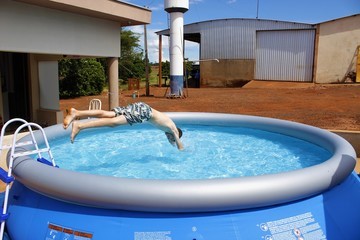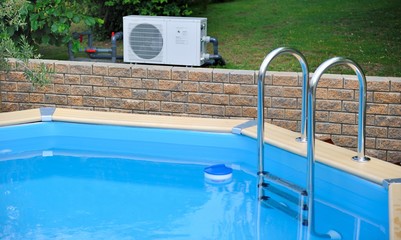Pool Heater Cost Comparison
Electric and Gas Pool Heater Cost Comparison

Getting Gassed Up
If your household is on a natural gas line, you can opt to install a gas heater. If not, you can still have a gas heater, but you’ll require to use propane. This can increase your installation costs since you’ll need to purchase a propane tank. Depending on the rules of the area you live in, that may mean taking on the extra expense of burying the tank underground.
The average cost of a gas pool heater ranges between $1,500 and $2,500. Installation is extra and runs $500 to $1,500. Gas heaters normally cost less than their electric counterparts to install but more to operate.
Plugging It In
Some homeowners opt to heat their pool with an electric heat pump. These units are quite energy-efficient, provided that the outdoor temperature around them does not fall below 45 degrees Fahrenheit. Electric heat pumps cost around $2,500 and $3,500, with specialized installation adding about $1,000 to the cost. Although more expensive to purchase, an electric pool heater’s cost to run is usually less than a gas unit.
Cost of Running a Propane vs. Electric Pool Heater
Numerous factors will affect your actual pool heater costs. The prices of gas and electric heaters fluctuate, of course, as will the average temperature in your area and the amount of direct sunlight your pool receives daily. The size of your pool also matters, with larger pools costing more to heat as compared to smaller ones.
On average, nevertheless, a gas heater costs around $200 to $400 a month to run. Electric heat pumps cost less, coming in at about $100 to $200 per month. This difference in operating costs makes it clear that, though more expensive to install, an electric heater could save you money in the long term.
Taking Usage into Consideration

Also, remember the limitations of electric pool heaters. If you intend to keep your pool open when the temperature dips below 45 degrees Fahrenheit, you’ll require gas instead of electric irrespective of the cost. The temperature of your pool water matters as well. A person who comfortable swimming in 77-degree water will pay less to heat a pool than a swimmer who prefers a warm 85-degree pool.
Soaking up the Sun
If you live in a sunny area, you may need to forgo electric and gas pool heaters altogether and opt going solar. Solar energy is the cleanest and cheapest energy source to utilize, but installation is still pricey. In most areas, you can expect to pay around $5,500 for an installed solar system. Prices differ based on how many solar panels you require and how much direct sunlight your roof typically receives.
Although installation can be a bit costly, most solar pool heating systems lower energy usage enough to pay for themselves in about three years than a gas pool heater.
